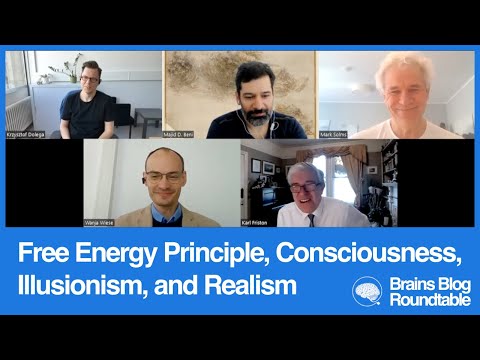
List of some of the papers and books discussed:
Friston, K. (2014). Active inference and agency. Cognitive Neuroscience, 5(2), 119–121. https://doi.org/10.1080/17588928.2014.905517
Dr. Wanja Wiese https://homepage.ruhr-uni-bochum.de/wanja.wiese/
Dołęga, K., & Dewhurst, J. E. (2020). Fame in the predictive brain: a deflationary approach to explaining consciousness in the prediction error minimization framework. Synthese, forthcoming, 1–26. https://doi.org/10.1007/s11229-020-02548-9
Dennett, D. (2009). Darwin’s “strange inversion of reasoning.” Proceedings of the National Academy of Sciences, 106(supplement_1), 10061–10065. https://doi.org/10.1073/PNAS.0904433106
Solms, M., & Friston, K. J. (2018). How and why consciousness arises: Some considerations from physics and physiology. Journal of Consciousness Studies, 25(5–6), 202–238.
Professor Mark Solms; http://www.psychology.uct.ac.za/psy/staff/professors/marksolms
Dr. Majid D. Beni: https://sites.google.com/site/majiddavoodybeni/?pli=1
Chalmers, D. J. (2004). Phenomenal concepts and the knowledge argument. In There’s Something About Mary: Essays on Phenomenal Consciousness and Frank Jackson’s Knowledge Argument (p. 269). MIT Press. https://philpapers.org/rec/CHAPCA
Wiese, W., Karl Friston, rubde J., Benjamin Fink, S., Lin, Y.-T., & Friston, K. J. (2021). The neural correlates of consciousness under the free energy principle: From computational correlates to computational explanation. Philosophy and the Mind Sciences, 2. https://doi.org/10.33735/PHIMISCI.2021.81
Friston, K. J., Wiese, W., & Hobson, J. A. (2020). Sentience and the Origins of Consciousness: From Cartesian Duality to Markovian Monism. Entropy 2020, Vol. 22, Page 516, 22(5), 516. https://doi.org/10.3390/E22050516
Professor Karl Friston; https://www.fil.ion.ucl.ac.uk/~karl/
Wiese, W., & Friston, K. J. (2021). Examining the Continuity between Life and Mind: Is There a Continuity between Autopoietic Intentionality and Representationality? Philosophies 2021, Vol. 6, Page 18, 6(1), 18. https://doi.org/10.3390/PHILOSOPHIES6010018
Dołęga, K., & Dewhurst, J. (2019). Bayesian Frugality and the Representation of Attention. Journal of Consciousness Studies, 26(3–4), 38–63.
We are pleased to announce the next Brains Blog Roundtable, which discusses the Free Energy Principle and the debate between realism and illusionism about consciousness. Please join Majid D. Beni and our excellent panellists Karl Friston (UCL), Mark Solms (University of Cape Town), Krzysztof (Krys) Dolega (Université Libre de Bruxelles), and Wanja Wiese (Ruhr University Bochum). The discussion will focus on free energy models of consciousness and their realist and illusionist interpretations.
Frankish, K. (2016). Illusionism as a theory of consciousness. Journal of Consciousness Studies, 23(11–12), 11–39.
Friston, K. J. (2018). Am I self-conscious? Frontiers in Psychology, 9, 579. https://doi.org/10.3389/FPSYG.2018.00579
Solms, M. (2021). The hidden spring: A journey to the source of consciousness. Profile books.
Chalmers, D. J. (1995). Facing Up to the Problem of Consciousness. Journal of Consciousness Studies, 2(3), 200–219.
Extended note, roundtable, Free Energy Principle, Consciousness, Realism and Illusionism,
Turing, A. (1950). Computing Machinery and Intelligence. Mind, 59(236), 433–460. https://doi.org/10.2307/2251299
Jackson, F. (1986). What Mary Didn’t Know. The Journal of Philosophy, 83(5), 291. https://doi.org/10.2307/2026143
Links to the participants’ pages (alphabetical order):
Solms, M. (2019). The Hard Problem of Consciousness and the Free Energy Principle. Frontiers in Psychology, 9(JAN), 2714. https://doi.org/10.3389/fpsyg.2018.02714
Chalmers, D. J. (2017). The hard problem of consciousness. The Blackwell Companion to Consciousness, 32–42.
Dr. Krzysztof Dołęga; https://dr-krys.github.io/

